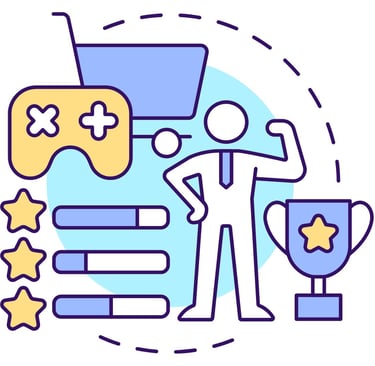Gamification in Education: How Play-Based Learning Enhances Retention
Explore how gamification boosts engagement, motivation, and memory retention in primary education through play-based strategies.
Yashneeil Singh
4/2/20252 min read


Gamification in Education: How Play-Based Learning Enhances Retention
As the educational landscape evolves, traditional teaching methods are increasingly supplemented by innovative approaches designed to improve engagement and knowledge retention. Among these, gamification—the application of game-design elements in non-game contexts—has emerged as a powerful pedagogical tool. Rooted in cognitive science and behavioral psychology, gamification in education transforms the learning experience into an interactive and motivating journey.
What is Gamification?
Gamification incorporates elements such as point scoring, competition, levels, badges, and immediate feedback into educational content. Unlike recreational games, gamified learning is purpose-driven, aiming to reinforce specific knowledge or skills while maintaining high levels of student engagement. This approach draws heavily from principles of intrinsic motivation and active learning.
Scientific Basis for Gamification
Empirical research supports gamification’s effectiveness in enhancing cognitive outcomes:
A meta-analysis in Educational Psychology Review (Dicheva et al., 2015) found that gamification significantly improves motivation, participation, and academic achievement.
Studies in Computers & Education (Hamari et al., 2016) show that gamified environments lead to increased time-on-task and improved conceptual understanding.
Research in Frontiers in Psychology (Sailer et al., 2017) confirms that well-designed gamified interventions enhance learning through feedback loops and positive reinforcement.
Key Benefits of Play-Based Learning
1. Improved Memory Retention
Games activate the brain’s reward system, releasing dopamine, which strengthens memory encoding and consolidation (Trends in Cognitive Sciences, Adcock et al., 2006).
2. Higher Engagement and Motivation
Game elements sustain student interest, reducing cognitive fatigue and increasing persistence in task completion.
3. Immediate Feedback and Self-Paced Learning
Gamification provides real-time progress indicators, enabling learners to assess their performance and adjust strategies accordingly.
Kimberlite Elementary School’s Gamified Learning Model
At Kimberlite Elementary School, gamification is thoughtfully integrated into daily lessons through teacher -student interactions, classroom-based challenges, and thematic activities. By blending educational goals with game-based techniques, the school ensures that learning remains both rigorous and enjoyable. This approach particularly benefits foundational literacy and numeracy, where repetition and practice are essential.
Conclusion
Gamification in education represents a scientifically grounded, student-centered approach to enhancing learning outcomes. By making education playful yet purposeful, schools can foster deeper engagement and long-term retention. Kimberlite Elementary School continues to innovate with gamified methods, ensuring students enjoy learning while building core competencies for future success.
References:
Dicheva, D., Dichev, C., Agre, G., & Angelova, G. (2015). Gamification in education: A systematic review. Educational Psychology Review, 27(2), 371–390. https://doi.org/10.1007/s10648-015-9301-5
Hamari, J., Koivisto, J., & Sarsa, H. (2016). Does gamification work? A literature review of empirical studies. Computers in Human Behavior, 57, 118–127. https://doi.org/10.1016/j.chb.2015.09.017
Sailer, M., Hense, J., Mayr, S., & Mandl, H. (2017). How gamification motivates: An experimental study of the effects of specific game design elements on psychological need satisfaction. Computers in Human Behavior, 69, 371–380. https://doi.org/10.1016/j.chb.2016.12.033
Adcock, R. A., Thangavel, A., Whitfield-Gabrieli, S., Knutson, B., & Gabrieli, J. D. (2006). Reward-motivated learning: Mesolimbic activation precedes memory formation. Trends in Cognitive Sciences, 10(7), 293–300. https://doi.org/10.1016/j.tics.2006.05.003
Education
Shaping futures through innovative early education.
Contact
info@kimberliteschool.in
9413337209, 8890799897
© 2026. All rights reserved.
